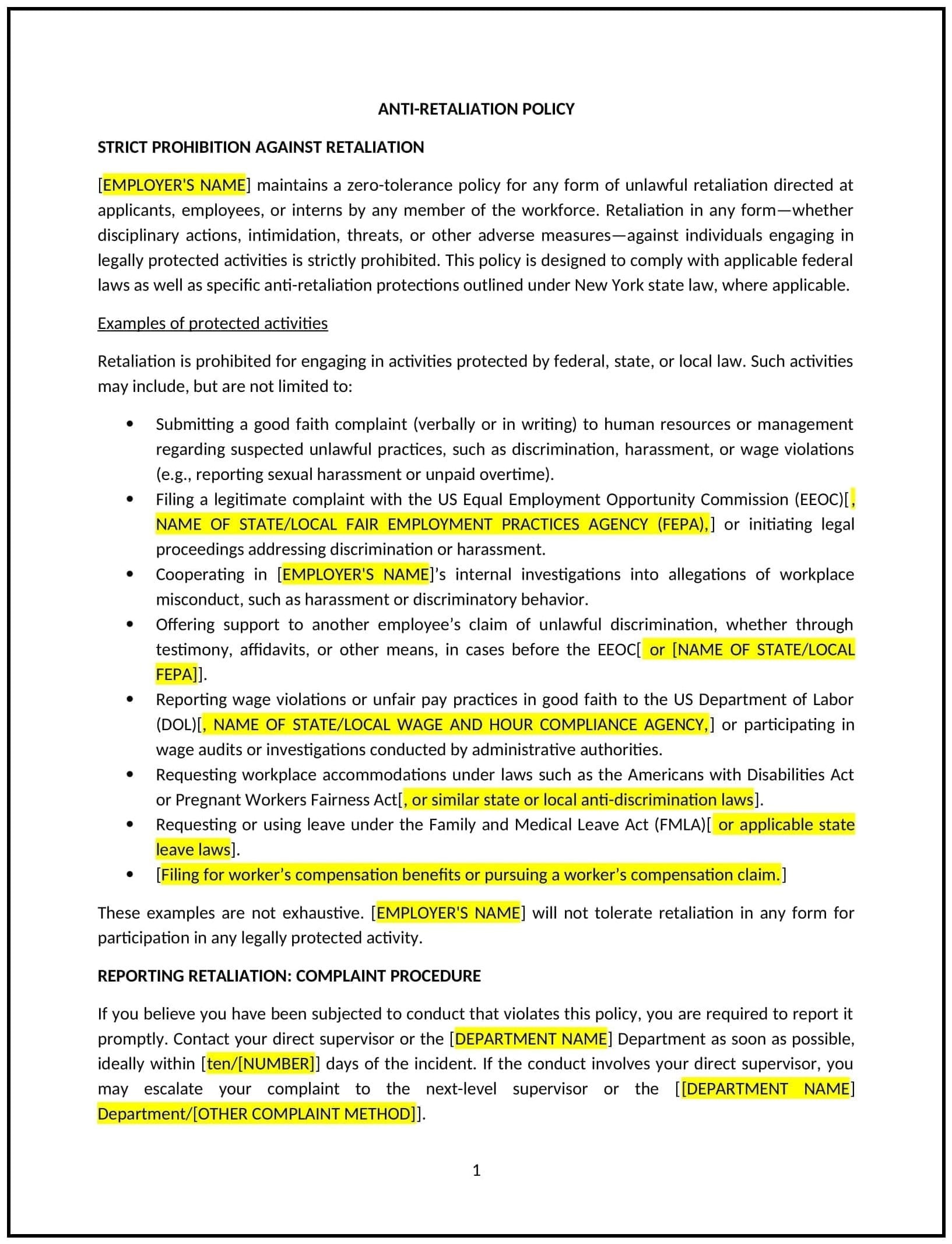Got contracts to review? While you're here for policies, let Cobrief make contract review effortless—start your free review now.

Customize this template for free
Anti-retaliation policy (New York)
An anti-retaliation policy helps New York businesses protect employees from retaliation for engaging in legally protected activities, such as reporting harassment, discrimination, safety violations, or other legal violations. This policy outlines the company’s commitment to ensuring that employees are not punished for asserting their rights, participating in investigations, or filing complaints. It also includes guidelines for how businesses will handle complaints of retaliation, how employees can report suspected retaliation, and the consequences for retaliatory behavior.
By implementing this policy, businesses can foster an environment where employees feel safe reporting concerns, ensuring that legal rights are respected and promoting a culture of transparency and accountability.
How to use this anti-retaliation policy (New York)
- Define retaliation: Clearly define what constitutes retaliation, including adverse actions such as firing, demoting, reducing work hours, or otherwise treating an employee unfairly because they have engaged in a legally protected activity, such as reporting misconduct or participating in an investigation.
- Establish reporting mechanisms: Provide employees with clear and confidential channels for reporting suspected retaliation, such as a designated HR representative or a third-party hotline. The policy should ensure that employees feel comfortable reporting retaliation without fear of further consequences.
- Investigate complaints promptly: Outline the process for investigating retaliation claims, including the steps for collecting evidence, interviewing witnesses, and resolving complaints. The policy should ensure that investigations are fair, impartial, and conducted in a timely manner.
- Set clear disciplinary actions: Define the consequences for employees found to be engaging in retaliatory behavior, including the range of disciplinary actions that may be taken, such as warnings, suspension, or termination, depending on the severity of the retaliation.
- Protect employees from retaliation during investigations: Ensure that employees involved in investigations are protected from retaliation throughout the process, including whistleblowers and those participating in interviews or providing evidence. The policy should guarantee that employees will not face negative consequences for their involvement.
- Promote a culture of respect and fairness: Emphasize that businesses are committed to maintaining a fair, transparent, and respectful work environment, where employees feel safe asserting their rights, raising concerns, and participating in investigations without fear of retaliation.
- Ensure compliance with New York state laws: The policy should be in compliance with New York’s laws regarding retaliation, including those related to whistleblower protections, discrimination, harassment, and safety violations. It should specify that retaliation is prohibited under both state and federal law.
Benefits of using this anti-retaliation policy (New York)
This policy offers several benefits for New York businesses:
- Promotes a safe and transparent work environment: The policy helps create an environment where employees feel empowered to report illegal or unethical behavior without fear of retribution, fostering a culture of transparency and trust.
- Reduces legal risks: By ensuring compliance with state and federal laws regarding retaliation, the policy helps businesses avoid lawsuits, fines, and penalties associated with unlawful retaliation.
- Enhances employee morale: Employees are more likely to feel valued and supported when they know that their rights will be respected and that they will not face retaliation for reporting concerns or participating in investigations.
- Encourages accountability: The policy reinforces the expectation that all employees, including managers and supervisors, will act fairly and professionally. It holds individuals accountable for retaliatory behavior, ensuring that misconduct is addressed appropriately.
- Improves reputation: A commitment to protecting employees from retaliation helps businesses enhance its reputation as an ethical and responsible employer, which can improve employee retention, recruitment, and relations with clients and the public.
Tips for using this anti-retaliation policy (New York)
- Communicate the policy clearly: Ensure that all employees understand the anti-retaliation policy and their rights under it. This can be done during onboarding, in employee handbooks, and through regular training sessions.
- Encourage employees to report retaliation: Make it clear that businesses take retaliation claims seriously and that employees should report any concerns immediately. The policy should ensure that employees are comfortable using the reporting mechanisms without fear of further retaliation.
- Monitor retaliation risks: Regularly review workplace practices and employee feedback to ensure that retaliation is not occurring in any form. The policy should include measures to identify potential retaliation risks early and address them before they escalate.
- Investigate thoroughly and impartially: Ensure that all complaints of retaliation are thoroughly investigated, with a focus on fairness and impartiality. The policy should ensure that investigations are conducted in a timely manner and that the outcomes are communicated transparently.
- Provide ongoing training: Offer training for employees and managers to ensure they understand what constitutes retaliation, how to prevent it, and how to respond appropriately if an allegation is made. The policy should reinforce that retaliation is never acceptable and provide guidance on handling sensitive situations.
- Review and update the policy regularly: Regularly review the anti-retaliation policy to ensure it remains compliant with New York laws, reflects the needs of the workplace, and incorporates any changes in legal requirements or industry best practices.